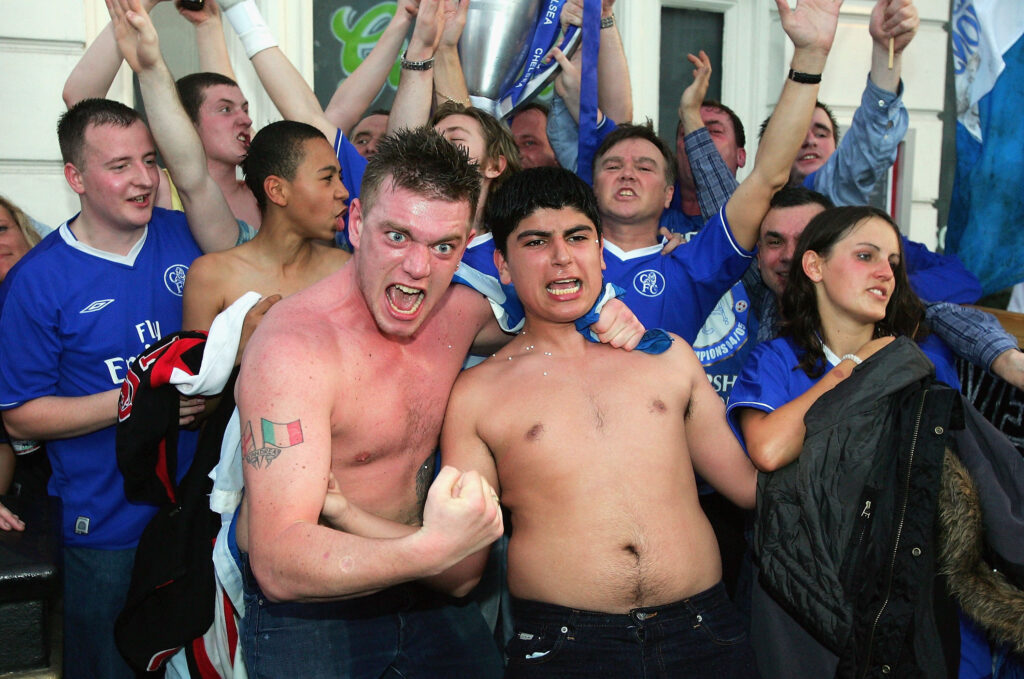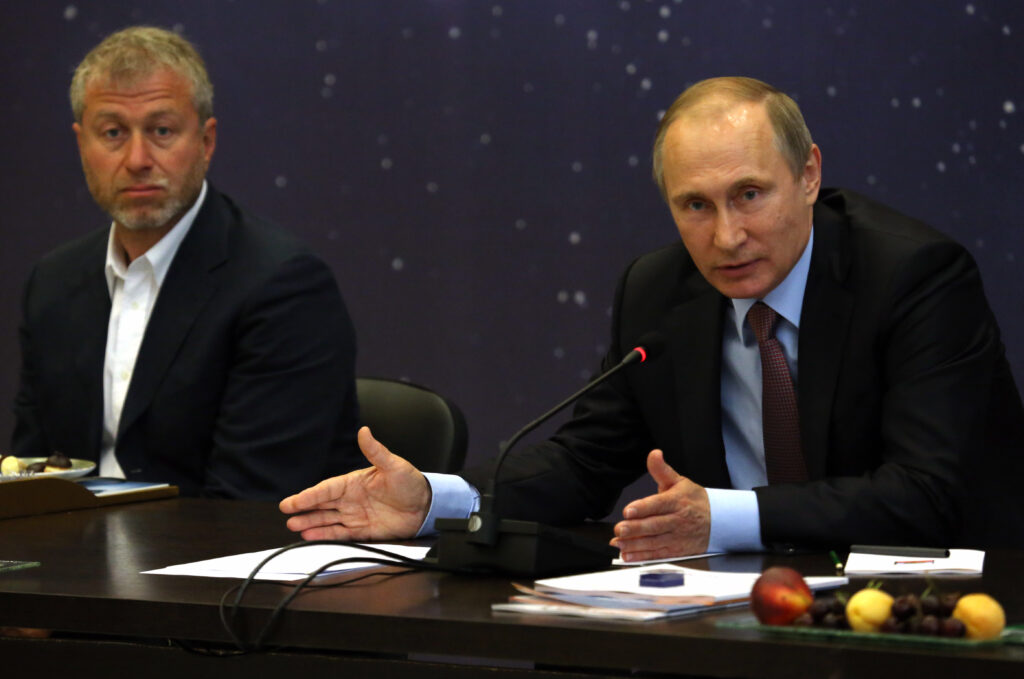To look into the grey, expressionless eyes of the Chelsea owner was to look into the abyss of modern crony-capitalism’s excesses and structural injustice. (Photo by Clive Mason/Getty Images)
Злорадство. Schadenfreude, to you and me. There’s a lot of it about following this week’s freezing of Russian oligarch Roman Abramovich’s assets in the UK, including Chelsea Football Club. Until he swooped in to buy the West London club for what now seems to be the paltry sum of £150-million almost 20 years ago in 2003, Chelsea had won the first division in English football just once, in 1954-55. Since then they’ve won it five times. Oh, and throw in a couple of Uefa Champions Leagues too.
Progress? No doubt, if you’re a die-hard Chelsea fan. Before the modern era, it had a dismal ground, Stamford Bridge, incongruously close to the glitz and glamour of the adjacent Kings Road, and infamous for its grizzly home end, known colloquially as The Shed.
In the 1970s, they had characterful players such as — at the rough end, Ron “Chopper” Harris and the huge, and hopelessly clumsy, Mickey Droy — and, at the Kings Road end, so to speak, Peter Osgood and Charlie Cooke.
They were more likely to dazzle in the nightclubs of the West End than on the field, although I once found myself at Stamford Bridge to witness a remarkable 4-2 FA Cup victory over Bill Shankley’s Liverpool, who were at the time the European Cup holders.
These were the days when hooliganism was a core part of the DNA of English football. Travelling to support one’s team away from home was often an exercise in risk management. One way of mitigating it was to summon the fiscal space to purchase tickets in the (seated) stands, rather than in the (terraced) away end, where one was a sitting duck for all manner of hostile unpleasantries, both inside and outside, after the game.
In the stands one generally encountered a more civil and less violently-inclined class of football fan. But at Stamford Bridge this rule of thumb did not apply. Chelsea’s wealthier fans were not only wealthier but nastier and more racist.
Chelsea’s iconoclastic, long-standing former chairman, Ken Bates, seemed to share this dim view of the home fans. As hooliganism got worse in the early 1980s he not only installed a barrier to keep the peasants from the field, but used the same electric fence that he used on his farm to keep cows from wandering off.
But the Greater London Council ruled that he could not turn it on as it would breach health and safety rules.
Many European clubs’ fanbase contains a racist, or even neo-Nazi, element, or has done at some point over the past half-century. But Chelsea’s has been a sustained and apparently resilient relationship with racism.
I came face to face with it in 2004 as I approached Highbury for the first time in the 10 years since I had emigrated to South Africa. It was an unseasonably balmy April evening, and the soon-to-become “Invincibles” were playing a second leg Champions League quarter final against Chelsea. As I rounded the corner to the ground, my light-headed excitement was instantly crushed by the sight of a large group of Chelsea fans marching up Avenell Road from Arsenal Tube Station towards the away end, the famous Clock End.
 Chelsea fans celebrate winning the Premier League for the first time after being bankrolled by Abramovich. (Photo by Mike Hewitt/Getty Images)
Chelsea fans celebrate winning the Premier League for the first time after being bankrolled by Abramovich. (Photo by Mike Hewitt/Getty Images)
Grey skin hue matching grey apparel; they cast a long shadow, as they sang a ghastly adaptation of the home team fans’ homely to their captain, Patrick Vieira. “Viera, whoah, Viera; he comes from Senegal, he plays for The Arsenal” had been replaced by “Viera, whoah, Viera; he comes from Senegal, he is a cannibal”.
Sickening. As recently as 2019, Chelsea fans were prosecuted for singing racist songs at a bar in Prague. Social media is littered with video evidence — including a particularly odious clip of Blues’ fans on the Metro in Paris in 2015 singing “we’re racist, we’re racist, and that’s the way we like it” having just prevented a black commuter from entering the carriage. Four men were given suspended prison sentences and ordered to pay the victim 10 000 Euros.
From Russia without love
So what has all this got to do with Abramovich? Nothing and everything. In many ways, this was a marriage made in heaven. Chelsea’s odious fanbase, injected with a vast sum of ill-gotten roubles. Nouveau riche Russian wealth, with links — denied but not credibly — to a fascist autocrat, Vladimir Putin, who has meddled in the domestic political affairs of numerous countries, including South Africa and the UK, who dithered for two weeks before implementing sanctions against Abramovich and a handful of other Russian oligarchs that have made London their home.
In an interview with the Financial Times shortly after his acquisition, Abramovich said: “I don’t look at this as a financial investment. I look at it as a hobby, as a sport rather than an investment. I’d look at it as something to have fun with rather than having to realise a return.”
Money-laundering in all but name. Every now and then Abramovich has turned up and with the same ham-acting skills that Boris Johnson shows when pretending to be contrite having been caught lying yet again, feigned interest in his club’s footballing progress.
Mightily impressive it’s been. But fuelled by Abramovich’s cash. As Arsenal manager Arsene Wenger pointed out recently, his entry into the Premier League was a game-changer.
“I would say he was the first big investor [before] the Glazers to come in, at a golden period for a guy that was a billionaire. There was no Financial Fair Play, you could put as much money in as you wanted,” Wenger told beIN SPORTS.
Again, some perspective is needed: Abramovich was not the first rich man (or woman) to throw their wealth at a football club; my school mate Mark Goldberg saw the rise in computers coming in the 1980s and rounded up most of the best IT technicians in London and made millions selling them to companies through his recruitment business. He then lost it all on his childhood club, Crystal Palace.
 Abramovich is now paying the cost for his links to Vladimir Putin. (Photo by Mikhail Svetlov/Getty Images)
Abramovich is now paying the cost for his links to Vladimir Putin. (Photo by Mikhail Svetlov/Getty Images)
But Abramovich was the biggest and the wealthiest. Many others have followed in his wake — with a variety of motives apparently; some see the English Premier League as a smart investment, others for the cache of owning a club in the world’s most successful and popular league.
A playground for the super-rich, imposing an oligopoly of power and dominance that is very hard to break into. Since Abramovich bought Chelsea only Leicester City outside of the “big five” clubs have won the Premiership; Chelsea, Manchester United and Manchester City have won 15 titles, and Liverpool one.
Cold-blooded economics
It’s trite to lament the ultra-capitalism on steroids character of modern football; the queasy bubble of fantasy life cut off from the reality of normal life for the great majority. Which it’s its whole point, its motive force, its historical didacticism. A grand escape, however noxious.
And since it’s such a popular global product it’s hard to argue against it as a commodity; the football is better, the stadiums are safer and better, and you can watch it on the telly pretty much anywhere on the planet.
It’s a constant dilemma. Do I prefer the design qualities and excellence of the Emirates stadium when compared to Highbury’s cosy, chaotic charisma? No. Do I like the fact that no one’s likely to pee in my pocket half way through the second half? Yes.
There has been a soullessness to this economic revolution in football and its consequent commodification.
Abramovich was the essence of this. Watching him watching Chelsea and trying to discern any sign of passion or authentic support was akin to searching for the beating heart of a Harry Potter dementor and having life sucked out of one’s body in the process.
To look into the grey, expressionless eyes of the Chelsea owner was to look into the abyss of modern crony-capitalism’s excesses and structural injustice.
Perhaps it’s unfair to say that this one rich Russian represents that’s all that’s wrong with football, just as it’s hardly fair to argue that Chelsea represent everything that’s wrong and has always been wrong with football. But since football is rarely if ever about what is reasonable and rational, let’s just do so anyway.
And now Abramovich and Chelsea are in trouble, facing uncertain futures.
Good. Злорадство.
After all, we’re talking about the man who is once said to have had his private jet fly from London to Baku with a takeaway from his favourite Sushi restaurant, which really does say everything that needs to be said.
Will the football bubble now burst? Probably not. But it’s a start.
Do svidaniya, Roman. And please don’t come back. Spasibo za nichego.